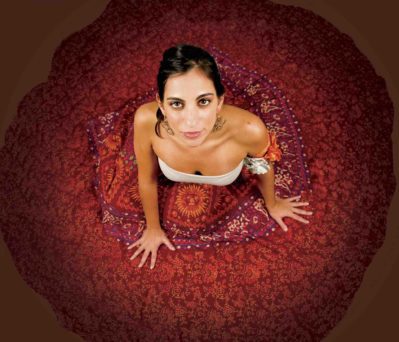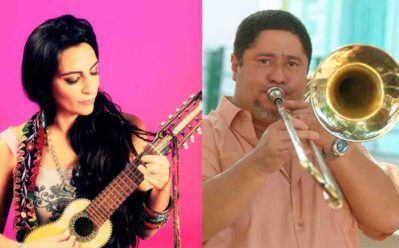INTERVIEW: Sofia Rei connects jazz, electronic, South American folk into wonderful musical mix

Sofia Rei is a singer, songwriter and producer who defies easy categorization. She’s a performer who blends many different styles and constantly looks to reinvent her musical output. On her 2012 album, De Tierra Y Oro, her unique vocal skills are on wondrous display, breathing life into such tunes as the catchy “La Gallera” to the thoughtful resonance of “Noche.”
Rei will bring her music to the Blue Curtain series at Petoranello Gardens Amphitheater in Princeton, New Jersey. She will be joined on the double bill with Papo Vázquez Mighty Pirates Troubadours. Admission is free.
“I’m bringing my band,” Rei said in a recent phone interview. “These musicians that are going to be performing with me are kind of my musical family. We’ve been playing together for many, many years, and we will be presenting repertory from my last three albums and some new music that we’ve been putting together these past few years. … The type of music we’re doing now, it’s a mix of South American folkloric music mixed with jazz mixed with other contemporary styles and a tiny bit also the use of electronic instruments and traditional instruments from all throughout South America.”
Rei has cut a unique and trailblazing path through the New York City music scene. She was born in Buenos Aires and relocated to the Big Apple more than a decade ago. She has recorded several albums, and the singer-songwriter tries to follow her own career path and will only cut a new album when the timing and inspiration are just right.
“In a way there is the time when you feel it’s right to do it, and there’s also the pressure of how the music business works where everybody is spitting records once a year because they have to,” Rei said. “And I never really wanted to do it like that, so when I go to the studio, I already want to be very, very, very clear in my head of what the direction of that record is going to be, what is the sound that I want, and what exactly I want to say with that album rather than just putting a collection of songs together and going into the studio.”
She has been taking some time before the next album, mostly because there’s another musical shift she’s experiencing in her career. Right now she’s exploring new sounds and changing the way she approaches the music.

Rei started as a classical musician and then turned to opera singing in her home country of Argentina. Eventually she turned her focus to improvisation and jazz, exploring the possibilities of the voice as an instrument.
“That brought me to the U.S. to study with people that really knew how to do it and to expand the knowledge of vocal improvisation and also the jazz language as a musical language,” she said. “And after all that I kind of went back to my South American roots and exploring things that I had no idea existed actually in South America.”
Although Rei lived in South America, she didn’t learn the many rich cultural traditions of the continent until she ventured to New York City. Her childhood in Buenos Aires exposed her to some folkloric traditions, but the connections to the entirety of Latin America came much later.
“You might be very close to Peru, but you do not know what is going on with your neighbors,” she said. “Or you might not know what is going on in Bolivia. You might not know what is going on in Paraguay, and so on and so forth, so coming to New York about 11 years ago I started getting really involved in South American music. And I got invited to be part of many projects and many bands that were doing South American folk. Some of them doing very traditional, let’s say, Colombian music from the Atlantic coast of Colombia or music from the Pacific coast like the whole Afro-Peruvian styles. And I got really, really fascinated by that, and so that all together started to be part of the musical DNA of what I’m doing now.
There are days now when Rei will grab her charango, a small South American guitar, and loop her voice with some electronic equipment. Her quest is to keep exploring her voice as an instrument, seeing how far it will take her in different directions. Evolution seems to be key for the singer-songwriter.
“I’m not concerned about presenting a pure form of let’s say folkloric music from my country or any other South American country,” she said. “I think there is a misconception also with the whole concept of folkloric music or roots music because if we think of it, this is normally music that’s in a constant evolution. There are changes, so many changes and accepted changes, and it’s music that’s alive and that’s shaping and taking hopefully the influences of the surrounding environment. And sometimes I feel like to go into this purist mode with it actually kills the possibility of the evolution of this music.”
Rei makes it clear, through her words and songs, that she is not a folklorist. Instead, she’s someone who has researched and been influenced by folkloric music, and that’s a profound difference. She also didn’t grow up in a musical family in which folkloric music served as the cultural backbone. The appreciation came later in life and mixed with other influences. For example, in high school, Rei was a fan of punk rock.
“If you wear a poncho on stage or if you’re sipping a mate on stage [does] that makes you more authentic,” Rei said. “If I do that, that would actually be taking me away from my authenticity. … I’m somebody that grew up in Buenos Aires. I was exposed to classical music from since I was a kid. I listened to punk rock through high school. I was exposed to a lot of music from all over. You would be kind of silly to kind of close myself to all these influences, to all this music I listen to, to all the things that I’ve heard all throughout this past year traveling all around the world, performing, meeting people, collaborating with other musicians that taught me music from their own countries or from their own backgrounds.”
She added: “I think I can [use] different interesting elements from classical music or from jazz or from folkloric music, and in the case of folkloric music it’s mainly the rhythm, which is very important. And it’s probably one of the most interesting components.”
In addition to the Princeton concert, Rei will perform a residency at New York City’s The Stone in downtown Manhattan, starting July 19.
Whether in New York, New Jersey or Buenos Aires, no matter who the audience members might be at her gigs, there is an interesting dynamic in the crowd. If her fans speak Spanish, they can follow along with her lyrics. If her fans cannot speak Spanish, there’s still a focus on the beat, the rhythm, the universal musical language that is achieved.
“In the U.S., it’s mixed because there are so many people that speak Spanish that in any given context I’m sure there is quite a percentage of people that would be Spanish speakers or would understand the language,” she said. “A majority of our audiences here in the U.S. wouldn’t understand what I’m singing in that sense, and the same thing in Europe and same thing in so many places we travel presenting this music. I’ve heard it a few times, and it warms my heart to hear when at the end of the concert somebody comes and says, ‘I had no idea what you were saying, but you make me cry. Or I felt a very strong emotion.’ And I’m like this makes sense. This is what music is all about. It’s a universal language.”
By John Soltes / Publisher / John@HollywoodSoapbox.com
Sofia Rei will perform at the Blue Curtain series at Petoranello Gardens Amphitheater in Princeton, New Jersey, on Saturday, July 16. Click here for more information.


Sofia is a brilliant musician who can also explain very clearly what she does in the stage. But, as she says, the most important is that her music gets deeply in your heart. As all great artists, Sofia illuminates our world and makes it a better place to live! Thank you, dear!